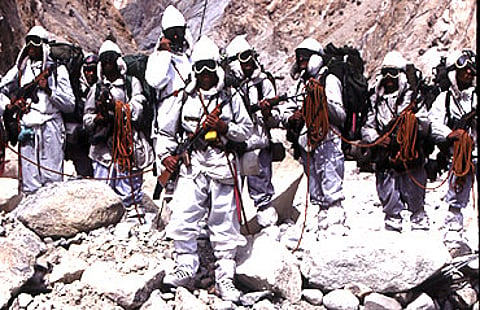Ask No Questions
A Command chief is booted for cracking down on corruption
- Tent scam: Inquiry and action into the "emergency" purchase of tents
- Egg scam: Showcause notices issued to officers and men, including a Maj Gen
- Diversion of high-altitude rations: An inquiry has been ordered.
- Frozen meat scam: Issued a letter of displeasure to Lt Gen S.K. Dahiya
- Pressed for a crackdown on corruption at the Army Commanders Conference
***
- The posting from an operational command to a non-operational command without citing any reason casts aspersions on Panag's conduct as an officer.
- The army chief was dismissive and did not explain why he was being transferred. He maintained he was not obliged to justify the posting of an officer.
- During Panag's tenure, there was visible decrease in cross-border infiltration. Simultaneously, there's been an improvement in the security situation in J&K. The army had also made the atmosphere conducive for conducting state polls.

Antony and senior MoD officials were initially not keen on the transfer. They felt they should not violate the mandatory norm that an army commander must serve at least two years in an operational command. In the last decade, only Gen Deepak Kapoor has served a lesser term. He was transferred to army HQ prior to taking over as the chief. Points out a senior ministry official: "It is only in the rarest of rare cases that a commander is transferred. Panag's new posting is all the more disturbing since he had only nine months to go before he retires. It'll send a wrong message—that fighting corruption invites punishment."
Senior army officers Outlook spoke to fear Panag's removal by the top brass has already done great damage. Rules and norms, they point out, are sacrosanct in the forces and bending them without "valid" reason is bad for morale. The relevant criterion laid down is that only those generals who have a residual service of at least two years are eligible for selection to the post of army commanders. The subtext: they are expected to complete their 24-month term. Colonel Sudhir Sakhuja, official spokesperson, admits "it's true that a minimum two years' residual service is mandatory before an officer is selected to be an army commander". So why wasn't Panag allowed to complete his term? "Transfers are effected in organisational interest," is the army's terse explanation.
Meanwhile, it has been reliably learnt that the Appointments Committee of the Cabinet (ACC) was forced to ignore the prescribed norms in clearing Panag's transfer. Sources close to the army chief insist the Lt General was removed only because lower formation commanders had complained about his pushy style of functioning. But those who have held operational commands see very little merit in this. Says one officer: "If an army commander in J&K is not pushy, he'd be guilty of being termed lax."
Replacing Panag in the Northern Command will be Lieutenant General P.C. Bharadwaj. Ironically, the army was rocked last year by the Siachen ration swindle during Bharadwaj's tenure as chief of the Leh-based 14 Corps. The scam was brought to light by the J&K police which has registered 11 firs and has so far effected 35 arrests. The names of senior army officers figured in the court statements made by the accused and the role of the commanding officer of the fifth battalion of the Rajput regiment (under the 14 Corps) is being probed. Many now wonder whether it would have been wiser to wait for the police to conclude its inquiry before handing over the Northern Command to Bharadwaj.
For now, Panag has been shifted to Lucknow, ostensibly to serve the army's "interests". But the shocking cases of graft will continue to loom large. Panag, known as the rare GOC-in-C who raised the issue of corruption at last year's Army Commanders' conference, will in all likelihood fade away like all good soldiers. But what about the damage done to the institution that is the army?
Tags